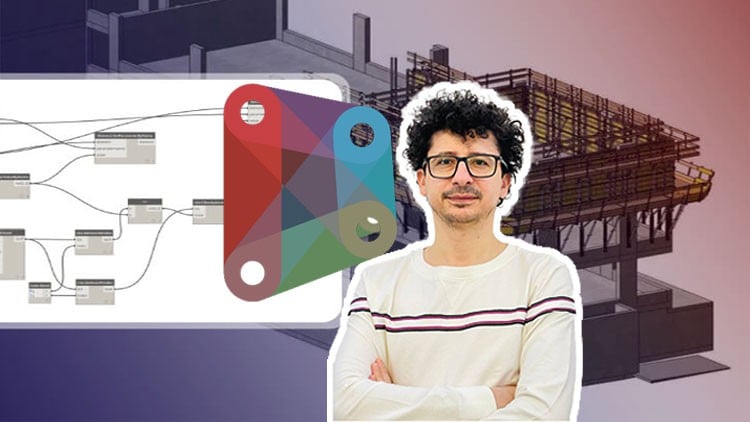
Dynamo Decoded: From Fundamentals to Expert Automation in Revit for Parametric Design and Beyond
⏱️ Length: 5.0 total hours
⭐ 4.92/5 rating
👥 6,325 students
🔄 April 2025 update
Add-On Information:
Note➛ Make sure your 𝐔𝐝𝐞𝐦𝐲 cart has only this course you're going to enroll it now, Remove all other courses from the 𝐔𝐝𝐞𝐦𝐲 cart before Enrolling!
-
Course Overview
- This advanced, project-based course elevates your Dynamo proficiency from proficient user to an automation architect within the BIM environment.
- Designed for those ready to transcend node-by-node operations, you will immerse yourself in creating sophisticated, integrated computational workflows that tackle real-world BIM challenges.
- Moving beyond basic script creation, this Level 3 program focuses on strategic problem-solving, equipping you with the expertise to design and implement robust, scalable Dynamo solutions for complex architectural and engineering projects.
- You’ll explore the art of computational design, not just as a tool for geometry generation, but as a powerful framework for data management, design optimization, and process automation within Revit.
- The curriculum is meticulously structured around practical, industry-relevant scenarios, ensuring that every concept learned is immediately applicable to enhancing project efficiency and design quality.
- Prepare to unlock the full potential of Dynamo, transforming design intent into intelligent, automated processes that redefine your approach to BIM project delivery.
-
Requirements / Prerequisites
- Intermediate Proficiency in Dynamo: A solid working knowledge of Dynamo’s visual programming interface, including familiarity with common nodes, basic data types, and graph logic. This is not an introductory course.
- Strong Understanding of Revit: Comprehensive experience with Revit’s functionalities, including element categories, families, parameters, worksets, and the underlying data structure.
- Computational Thinking Aptitude: An ability to break down complex problems into logical steps, think parametrically, and approach design challenges with a systematic, algorithmic mindset.
- Basic Scripting Exposure (Optional but Recommended): While not strictly mandatory, prior exposure to Python scripting within Dynamo or other programming languages will be highly beneficial for understanding advanced concepts.
- Access to Software: Stable installations of Autodesk Revit (2020 or newer recommended) and Dynamo for Revit.
-
Skills Covered / Tools Used
- Advanced Graph Optimization: Techniques for building efficient, stable, and readable Dynamo graphs, including strategies for performance enhancement and debugging complex scripts.
- Strategic Data Management: Mastering sophisticated list manipulation, data tree navigation, and the intelligent querying of Revit elements and their properties to support highly specific automation tasks.
- Custom Workflow Development: The ability to conceptualize, design, and implement tailored Dynamo solutions that address unique project requirements, moving beyond off-the-shelf node functionalities.
- Robust Error Handling: Implementing defensive programming practices within Dynamo scripts to anticipate and gracefully manage potential errors, ensuring the reliability and stability of your automated processes.
- Interoperability Enhancement: Exploring methods to connect Dynamo scripts with external data sources or refine data exchange workflows, extending Revit’s capabilities and facilitating integrated project delivery.
- Computational Design Principles: Applying advanced parametric and algorithmic thinking to solve intricate geometric and data-driven design problems, fostering a deeper understanding of generative processes.
- Script Documentation and Maintainability: Best practices for documenting Dynamo graphs, making them understandable, reusable, and maintainable by yourself and other team members over the project lifecycle.
- Tools Used: The primary tools will be the Dynamo visual programming environment integrated with Autodesk Revit. Emphasis will be placed on leveraging advanced out-of-the-box Dynamo nodes, strategically chosen community packages, and custom script blocks for bespoke functionalities.
-
Benefits / Outcomes
- Become a Dynamo Automation Expert: Emerge as a go-to specialist capable of designing and implementing complex, project-specific automation solutions that significantly enhance BIM workflows and data integrity.
- Drive Project Efficiency: Drastically reduce time spent on repetitive, manual tasks, freeing up valuable resources for more critical design and analysis work, and accelerating project timelines.
- Unlock Advanced Design Capabilities: Gain the ability to tackle sophisticated parametric modeling challenges, explore complex design iterations rapidly, and generate innovative forms that would be impossible or impractical with traditional methods.
- Improve Data Quality and Consistency: Implement automated checks and processes that ensure the accuracy, completeness, and consistency of BIM data throughout all project phases, leading to fewer errors and better decision-making.
- Develop Custom Computational Tools: Acquire the skills to create bespoke Dynamo graphs and potentially custom nodes that effectively extend Revit’s native functionalities, tailoring the software to your specific project needs and firm standards.
- Enhance Your Career Profile: Position yourself as a leader in computational design and BIM automation, equipped with highly sought-after skills that are transforming the Architecture, Engineering, and Construction (AEC) industry.
- Foster Innovation: Cultivate a mindset of innovation, constantly seeking opportunities to optimize processes, experiment with new design approaches, and push the boundaries of what’s possible in BIM with Dynamo.
- Strategic Problem Solver: Develop a refined ability to identify complex BIM problems and architect effective, programmatic solutions using Dynamo, moving beyond simple task automation to strategic workflow design.
-
PROS
- Highly Practical and Project-Based: Focuses on real-world application, ensuring immediate relevance to industry challenges.
- Expert-Level Skill Development: Propels learners from intermediate users to advanced automation specialists in Dynamo for Revit.
- Boosts Workflow Efficiency: Directly contributes to significant time savings and accuracy improvements in BIM projects.
- Current and Highly-Rated Content: Benefits from recent updates and strong positive feedback from thousands of students.
- Empowers Custom Solution Creation: Teaches how to build bespoke tools tailored to unique project needs, extending Revit’s capabilities.
- Career Advancement: Equips participants with in-demand skills crucial for leadership roles in computational design and BIM.
-
CONS
- Demanding Prerequisites: Requires a substantial pre-existing knowledge base in both Dynamo and Revit, potentially making it challenging for those without a strong foundation to fully grasp the advanced concepts presented.
Learning Tracks: English,Design,Architectural Design
Found It Free? Share It Fast!